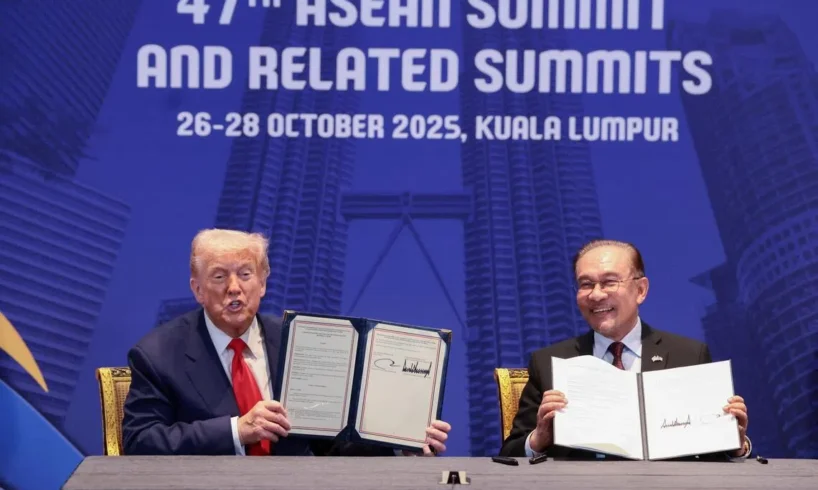
KUALA LUMPUR – Malaysia has defended its
reciprocal trade agreement with the United States
, saying on Oct 29 that the country has not surrendered its sovereignty in safeguarding the economy from harsher sanctions.
The deal, signed by Prime Minister Anwar Ibrahim and US President Donald Trump on the sidelines of the Asean summit, maintains the White House’s unilateral 19 per cent tariff on Malaysian exports, but grants exemptions for 1,711 essential products, including electronics, rubber, and palm-oil derivatives.
However, a clause requiring Malaysia to align itself with the US on matters of economic restrictions or sanctions against a third country has raised alarm bells on both sides of the political divide, with critics warning it may threaten the country’s independence and longstanding stance of neutrality.
Addressing the issue in Parliament on Oct 29, Investment, Trade and Industry Minister Tengku Zafrul Aziz said the government had no choice but to negotiate with the US and that the agreement represented “the best possible outcome” for Malaysia.
“There are some who said we surrendered our necks in the negotiations,” Datuk Seri Zafrul told lawmakers.
“But this is the geopolitical reality we face as a freely trading nation engaging with the world’s largest economic power – which is also our biggest trading partner.”
Trade between the two countries reached RM325 billion (S$100 billion) in 2024, with Malaysian exports accounting for RM200 billion. The surplus led to Malaysia being hit with a 24 per cent tariff, later raised to 25 per cent before being revised again to 19 per cent in September.
Mr Zafrul said the controversial Article 5.1 in the deal does not oblige Malaysia to adopt Washington’s policies, as “guardrails” within the broader text protect national interests. According to him, Malaysia is only required to discuss such matters with the US and act “if necessary”, in line with domestic laws and within a prescribed timeline.
“The provision also stressed that any actions taken by Malaysia have to be on issues of shared economic concern – that is, a shared problem for both Malaysia and the US,” he said.
But Mr Azmin Ali, a former international trade and industry minister, disagreed. The secretary-general of opposition pact Perikatan Nasional called Article 5.1 the “most damaging clause” in the agreement, saying it forces Malaysia to take Washington’s side in its conflicts.
“If Washington decides to block imports from China or Russia, Malaysia must do the same, even if it harms our economy,” said Datuk Seri Azmin in a statement.
“By aligning Malaysia’s policies with US decisions, the agreement risks driving away investors who value Malaysia’s neutrality and stability.”
Similar concerns were raised by the parliamentary select committee on international relations and trade on Oct 28, which announced a hearing on Nov 12 to review the agreement.
Its chairman Wong Chen said representatives from Mr Zafrul’s ministry, the US Embassy in Kuala Lumpur, as well as economists and business chambers are invited to explain the pact and its impact on Malaysia’s existing trade deals, including with members of the Brics grouping, such as China and India.
Besides Article 5.1, Malaysia also waived its right to tax US social media platforms and cloud service providers, as well as loosened broadcast regulations mandating 80 per cent of airtime to be dedicated to local programming.
Mr Wong said Malaysia has 60 days to raise objections and propose amendments before the agreement takes effect, and the committee will make recommendations to the government after the hearing.
“Hopefully we can get some compromise on certain of these clauses which we deem…to be – on surface reading – threatening to Malaysia,” said Mr Wong, who is from Mr Anwar’s Parti Keadilan Rakyat (PKR).
Despite the concessions, Mr Wong told The Straits Times that the agreement also contains a clause that allows either side to impose additional tariffs “to remedy unfair trade practices, to address import surges, or to protect its economic or national security”, as well as take other measures under their respective laws.
“When we sign an agreement, we expect finality – that there’ll be no more adjustments,” Mr Wong said. “So clarity is important.”
Another PKR MP, Mr Hassan Karim, also lambasted the deal on Oct 28, claiming that Malaysia has made concessions worth RM1 trillion in total.
“This is an act of surrender, a transfer of wealth from poor Malaysia to the rich US. For centuries, we fought colonial powers for our sovereignty. Are we now giving it away without resistance?” he asked in Parliament, referring to the federation’s colonial history under the Portuguese, Dutch, British, and Japanese.
Mr Samirul Ariff Othman from consultancy firm Global Asia Consulting explained that while the treaty is binding, it is not statutory and Washington can “walk away at will”.
“Trump’s diplomacy thrives on symbolism over substance. These are politically driven compacts, not full trade constitutions,” Mr Samirul said.
“They let Washington claim ‘reciprocity achieved’, while partners claim ‘stability secured’. Everyone signs because it is cheaper to sign than to be sanctioned.”
On the other hand, Bank Muamalat Malaysia’s chief economist Afzanizam Abdul Rashid said that the exemptions of 1,711 product lines in the deal mark a significant win for Mr Anwar’s administration.
“It is about finding the right balance as both countries are dependable on each other, especially in the context of the global supply chain in the semiconductor space,” Mr Afzanizam said.
“Both countries are trying to meet somewhere in between to meet their respective objectives.”
Sign up for our weekly
Asian Insider Malaysia Edition
newsletter to make sense of the big stories in Malaysia.





